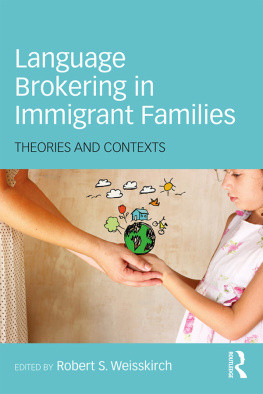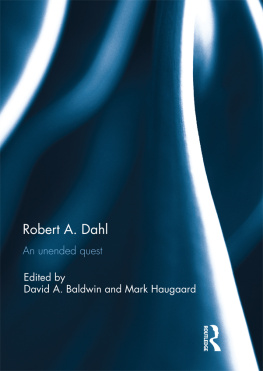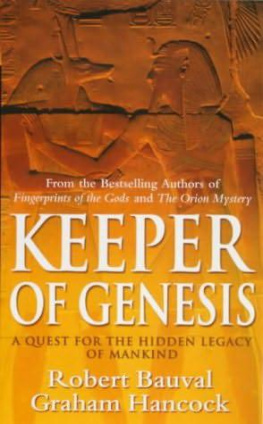First published 1997 by Ashgate Publishing
Reissued 2018 by Routledge
2 Park Square, Milton Park, Abingdon, Oxon, OX14 4RN
711 Third Avenue, New York, NY I 0017, USA
Routledge is an imprint of the Taylor & Francis Group, an informa business
Copyright R. N. Rapoport 1997
All rights reserved. No part of this book may be reprinted or reproduced or utilised in any form or by any electronic, mechanical, or other means, now known or hereafter invented, including photocopying and recording, or in any information storage or retrieval system, without permission in writing from the publishers.
Notice:
Product or corporate names may be trademarks or registered trademarks, and are used only for identification and explanation without intent to infringe.
Publishers Note
The publisher has gone to great lengths to ensure the quality of this reprint but points out that some imperfections in the original copies may be apparent.
Disclaimer
The publisher has made every effort to trace copyright holders and welcomes correspondence from those they have been unable to contact.
A Library of Congress record exists under LC control number: 97073408
ISBN 13: 978-1-138-31115-2 (hbk)
ISBN 13: 978-0-429-45893-4 (ebk)
In late December of 1985, social and behavioral scientists gathered in a New York restaurant to converse about bodies of research completed or being conducted in Great Britain, the United States and other parts of the world which, we could argue, had an impact upon public policy, which led to an improvement in programs and services, and which may have shaped the development and wellbeing of children, youth and families. Dr. Robert Rapoport moved comfortably among these invited guests, stopping at each table to chat. In his brief conversations he made an effort to affirm their individual viewpoints while offering alternative viewpoints, as though he were challenging them to give substance to their rather sweeping generalizations. Robert approached each person as though he was very familiar with their scholarship and publications. In point of fact, he was knowledgeable of their life's work. After all, he invited each of us for a reason.
We were assembled because Robert Rapoport had an idea: he believed that we social and behavioral scientists had something, and there was a thread of commonality running through our work, which needed to be crystallized, synthesized, and articulated. Robert felt it was important to identify and present research which made a difference, or what he called action research. In this era of cynicism, with the public questioning the value of academic scholarship and its utility, Robert felt the compelling need to demonstrate the saliency and impact that social science research has on families, children and youth. Magically, he assembled scholars from throughout the world to address the important theme of action research. This New York meeting, funded by the W. T. Grant Foundation, led to Robert Rapoport's classic Cambridge University book, entitled Children, Youth and Families: The Action Research Relationship. Ten years later, as we transition into the 21st century, action research and the public demand for accountability of social and behavioral science research has brought Robert Rapoport's vision and concern, raised a decade earlier, to center stage, Robert Rapoport anticipated the importance of action research and chose to give meaning to the subject, well in advance of its popularity and international interest. Was this fortuitous of Dr. Rapoport's future work?
A decade later at a restaurant in Budapest, Hungary, scholars from a diverse range of interests and professions assembled to give meaning to the concept of global values and global citizenship. The assembled included political scientists, economists, social workers, psychologists, sociologists, lawyers, spiritual leaders, national leaders and educators. Once again, Robert Rapoport "made the rounds" in greeting everyone individually, a deliberate effort to affirm the participants from throughout the world, and particularly from the Eastern Block nations, and to make everyone feel at home, welcomed and very much a part of a larger community, a global community, the very theme of the meetings. Obviously, this was a deja vu experience. Everything that happened had a ring of familiarity, even though the theme and the discussions themselves were distinctly different. This was a Robert Rapoport event. We embarked on and embraced these abstract topics of values and global citizenship with passion and an intensity so common to Robert's gatherings. From our different world views and scientific research, and even in the context of passionate nationalism and cynicism, Robert was able to draw from the audience threads of commonality as well as marked differences.
It should come as no surprise that Robert Rapoport was able to shape and give meaning to the importance of global citizenship and the role of the family in promoting shared global values. This book represents another bold step forward for Robert Rapoport, by giving meaning to the importance of shared values, beliefs, and a global sense of community. In this publication, the culmination and synthesis of meaningful discussions among friends and colleagues, Robert Rapoport once again brings to center stage a vitally important set of issues, seldom discussed and addressed in any context. This was not just any event and thus the publication is not just any book. Not only did the Hungary meeting celebrate the United Nations Year of the Family, but it brought together persons of different races, cultures, and interests, and thus the assembly was destined to find and give meaning to values and global citizenship. This was another Robert Rapoport event, orchestrated with a fine touch of class and caring, and also destined to take the shape of a book, this book, which will serve as a classic reference well into the future.
There are but a handful of scholars throughout the world who have the vision, the conviction, and the ability to assemble scholars and leaders to work together to give meaning to important social, political, and human concerns and interests affecting children, youth and families. Robert Rapoport stands among these select few. The meaning of Robert's efforts is certainly reflected in this book. In Robert's own preface, the book and its purpose is presented with a sensitivity and compassion so common to Robert's work. His familyRhona Rapoport, Lorna Rapoport and Alin Rapoport, gently and caringly affirm the importance of Robert's work in a Memoriam and place this book in the historical context of Robert's scholarly contributions which emphasized values from his beginning writing as a scholar. Global citizenship, Robert Rapoport argued, is an important, if not vital theme which places family and children throughout the world on common ground. Robert confronts us all with a simple challenge: to recognize the important role that families have in shaping our children and future generations with the values we pass on, values which he argues are global and not national. We trust that the readers of this book will also find meaning in the concept of global citizenship and in so doing, carry forth a sense of responsibility to continue to promulgate this belief.










